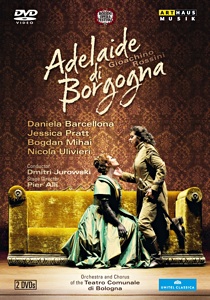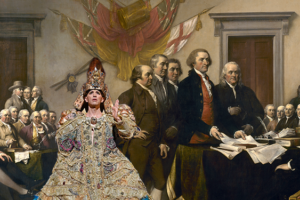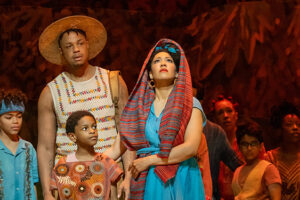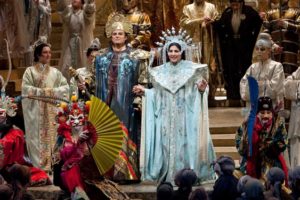
Giovanni Battista Pergolesi’s only opera for Rome was written to an existing libretto by the great Pietro Metastasio, L’Olimpiade, which had already been set by Vivaldi the year previously. It eventually became the most widely used libretto in history, inspiring more than 60 composers including Piccinni, Cimarosa, Paisiello, and Donizetti. When Pergolesi’s version premiered at the Teatro Tordinona in Rome in January 1735 the words on the page were still relatively warm which, apparently, could not be said of our young composer who would be dead the following March of tuberculosis at the age of 26.
This 2011 presentation of the Pergolesi Spontini Foundation is now on DVD and Blu-ray
courtesy of our friends at Arthaus Musik and documents a thoughtful staging that aspires to the highest musical standard.
In a deconsecrated church, now the Teatro Valeria Moriconi, which looks to hold less than 500 people, stage director Italo Nunziata has bisected the floor space with runways and a central playing circle leaving the tiny proscenium area to the ensemble of the Academia Montis Regalis. They are dominated in the front by the two largest theorbos (bass lutes) I have ever seen and give a crackling reading of the score led by Alessandro de Marchi at the harpsichord.
This critical edition prepared by Francesco Degrada and Claudio Toscani calls for four sopranos, two tenors and a contralto so we are graciously spared the wan hooting of countertenors.
Metastasio’s libretto is the very epitome of opera seria with, typically, all the physical action taking place in the wings while the emotional action holds the stage. Please don’t make me recount for you here the assumed identities, counterfactual reports of death and or suicide, misdirected betrothals and erroneous imprisonments occasioned in this entertainment. I sat through the nearly two hours of it and am still not sure what happened. Suffice to say that it’s one of those operas where, in the end, everyone ends up being not only innocent but related.
Nunziata’s decision to stage the piece within the auditorium I’m sure gave it an immediacy in the theater that, I’m sorry to say, doesn’t necessarily translates to the home screen. Despite the sense of occasion the audience is much too apparent and at times much too apparently not paying attention. They’re too busy thumbing through their programs or, since it seems to have been filmed on the hottest day of the year, fanning themselves with avidity. The camera seems always right on top of the cast (where else has is to go?). There is a balcony to one side that’s utilized at times to good effect and six dancers compliment the cast in moving and arranging the simple set pieces.
I thought surely there had been a mistake when I saw the name Raúl Giménez leading the cast for I was certain he’d been long retired since the days of my youth. I’m happy to report that this estimable tenor is still in very good form as King Clistene and although he takes a few minutes to warm up his role is comprised of only two short arias and quite a bit of recitative in ensemble. He adds a welcome gravitas to a very young cast and if his voice has been compromised by age, he more than makes up for it in suavity.
Milena Storti sings the role of Alcandro who is confidante to both the King and his daughter, Aristea. Her even shorter role affords her one aria at the beginning of the last act where she accounts the horrors of an attempt on her King’s life. She performs the piece well and luckily, for her fruity mezzo, it’s written in a more straightforward fashion than some of the florid showcases on display here.
Callow youth is represented by tenor Antonio Lonzano as Aminta, companion to Licida. He really just serves the plot by reporting back information and asking what happened next while, sadly, the poor lad isn’t even given an aria to call his own.
Now for the remaining pairs of lovers. Aristea, who’s the daughter of King Clistene, is in love with Megacle who’s come to compete in the Olympic games disguised as his best friend Licida who is also in love with Aristea. The winner of the games gets to claim Aristea as his bride. Meanwhile visiting Princess Argene is in love with Licida but being pressured into marrying Megacle. Any Shakespeare/George Lucas loving opera goer will forego the temptation to smack their forehead when it’s revealed that Licida and Aristea are actually twins separated at birth once he tries to murder the King (his Dad). By the time we got to the finale there were so many absurd foregone conclusions I thought I had early onset alzheimers.
Oh, did I mention that all the female characters are gowned in the same colors and likewise the male characters? Apparently there’s only one dressmaker and tailor in town, each working from a single bolt of fabric. Even sadder, everyone is wearing a wig that looks like the punk rock version of Davy Crockett’s coonskin cap and the makeup plot is the same one that all the employees at my local Sephora wear.
The icing on the cake is that they’re all four are played by women. Mezzo-soprano Jennifer Rivera as Licida gets the first monster aria of the evening and though the proximity of the camera highlights her look of Bambi in the headlights it’s readily apparent that her glinting mezzo is capable to the task. The performance catches fire with her final aria in act I “Mentre dormi” which is the first piece of real musical distinction and it ends with a cadenza that’s hummed. It took me so off guard I had shivers.
The Aristea is soprano Lyubov Petrova and she too is capable to the task at hand with a lovely full voice with a bright top and a richer bottom than we normally enjoy from a baroque specialist. Pergolesi’s writing is replete with echo effects, upward scales, staccati and no trill is left behind. She dispatches them all with confidence and ease. Her duet with Megacle that closes Act I is so luscious it’s easily the highlight of the evening.
Sofia Solovly is the Megacle, sporting a lovely chardonnay colored mezzo with a firm center and a liquid quality in the upper middle that shows a real ease in passage work once she’s past her first aria. She’s beautifully matched in the duet mentioned above and her last act showpiece, ”Torbido in volto e nero” finds her going from strength to strength.
Despite her top billing on the box cover (along with with Giménez and Petrova) Yetzabel Arias Fernandez has the smallest part of the four lovers, which is a pity because she has a youthful and clear sound that seems ready to bear mature fruit in a big way sometime very soon.
Once again, the highest praise to de Marchi and the Academia Montis Regalis for providing such superb support to this group of talented singers. It couldn’t have been easy leading everyone while rarely ever enjoying any eye contact with them. Also, to keep the musical drama as taught as possible is to his credit because, although it’s certainly here in the story, it’s stately to say the least in the music.
The very sharp picture and DTS 5.1 really puts you in the middle of everything and captures the orchestra to perfection. Subtitles are kept to a minimum during arias because of the repetition of the baroque format. If you’re a Pergolesi searcher you’ll find no disappointments here.
Rome remained a center of operatic activity eight decades later when Adelaide di Borgogna was Gioachino Rossini first opera seria written for the Teatro Argentina in Rome. One of the critics of the original performance said of this opera,”like a rose, it bloomed but a day.” In fact, Rossini carried the score with him for years after and scavenged off it as needed. In the booklet accompanying this wonderful new release
from Arthaus Musik, there’s an essay detailing about the composer’s borrowings here and there of various musical components, including many of the secco recitative and two of the lesser arias being written by a completely different composer assigned to help speed the plow towards carnival season. The essay builds to a hilarious conclusion with the revelation that the overture is, of course, from a different work entirely. I’m shocked, shocked I tell you!
This production demonstrates, though, that Adelaide di Borgogna stands proudly in the bel canto tradition and more than warrants its current excavation.
The plot, although based closely on historic events, is a frippery. The soprano Adelaide of Burgundy has had to surrender to the evil bass Berengario after he murders her husband. Berengario hopes to arrange Adelaide’s marriage to his own son, the tenor Adalberto, thereby making him King of Lombardy. Otto the Great, Holy Roman Emperor, a the dashing coloratura mezzo-soprano, saunters in to vanquish these villains and take the hand of Adelaide for himself in the name of love and honor. The libretto by Giovanni Federico Schmidt is generally disdained, but when the mezzo launched the Act I finale with the line,”As long as I hold a sword in my hand I shall fear nothing” I must confess even I felt the urge to take up arms against the invading horde.
Although I’ve seen Pier’Alli’s work reviewed on this site before this is my first experience with one of his productions and I have to say it’s a mixed bag. The credits list him as stage director, set, lighting and costume designer as well as video project director. In the brief “making of” documentary he speaks about integrating the cinema and theater. Later, though, he subdivides the back wall of the stage into in a dozen small squares with repetitive film movement, distracting from the music and the story.
His costumes however, moved well forward historically to the end of the Risorgimento, are both stunningly designed and sumptuously executed Gorgeous velvets and iridescent silks vie with with magnificent military uniforms and headgear. My single quibble is that the short-waisted costumes for the leading soprano have a matronly line that make her bosom appear very “low-slung” as my costume designer friend would say. This look may be appropriate for the widowed character but it’s not exactly glamorous.
His stage direction is traditional in the extreme with standard blocking and balletic semaphore gestures all around. An odd battle with umbrellas in the chorus I found easy to overlook.
I’m happy to say the singing is of such uniform excellence that it made it all the easier to overlook the eccentricities of the staging. With the exception of the rather haggard sounding Jeannette Fischer in the mezzo character part of Eurice who gets to keep her spurious solo (likely composed by Michele Carafa), the remainder of the cast could hardly be bettered and do the Rossini Festival proud.
Nicola Ulivieri as Berengario displays a mellifluous basso with a tremendous amount of technical control and excellent attention to the words. If his voice pales a tad once or twice at the very top of his range in fast passage work it’s a small price to pay for singing this rich and confident, most especially from a bass.
Romanian tenor Bogdan Mihai plays his son, Adelberto, and he’s the real tenore di grazia deal. With a beautiful ping to the top of his voice and a technique that includes enormous flexibility, he dispatches the scales and fioratura in this role with ease and assurance.
Ottone is the one known entity in this cast and Daniela Barcellona cuts a very fine figure of a man onstage with her height and sideburns. An accomplished singer of bel canto roles with an excellent voice and solid instincts, she might be a smidge more individual in her ornamentation and delivery, but that’s just splitting hairs with an ability this great. Her introductory scena is very well handled and her two duets with the Adelaide are easily the highlights of the work. I wish she’d dip into her gallon-jug mezzo just a tad deeper at times in cadenzas for the fun of it but, it’s quibbling.
Adelaide was the last of four roles composed for the formidable Elisabetta Manfredini-Guarmani by Rossini, after the soprano leads in Ciro in Babilonia, Tandredi, and Sigismondo. From what I know of those operas, and what’s evidenced here, she must have been an astonishing technician. I’m happy to say she’s more than met her match in the British born Jessica Pratt who obviously graduated with a Ph.D in Bel Canto Studies from somewhere.
The arsenal of technical demands in this part she meets with a cool head and a heart of fire, executing scales, staccati, pianissimi. gruppetti, echo effects and even a few triple roulades with a ferocious aplomb. From the moment she gains the stage and the ensuing trio she’s already at the top of her game. She’s especially supple in the duets with Barcellona and they pair off in the vocal tennis matches so dear the heart of the opera fan. The repeat of her final cabaletta, when the line is so completely obscured by the most bravura ornamentation imaginable, would send most sopranos in a desperate search of white-out to use on their sheet music. My mouth fairly hung open.
In fact it’s a great pleasure to be able to lean back and relax in the company of such a vocally assured cast. The chorus of the Teatro Communale makes a tremendously vigorous sound and I didn’t count them much over 50 singers which is doubly impressive.
Having already read the program notes, I hardly blinked when Dmitri Jurowski conducted the overture to La cambiale di matrimonio. He has a deft touch for this score and leads with a sure hand and offers excellent support to all involved. Rossini writes a showpiece for all four major characters in the last act and Jurowski’s supple leadership is clearly evidenced by the security of these performances. The orchestra plays with a verve that makes them sound mightier than their number as well.
So, is it great Rossini? No. We’d have heard it well before now if it was. But it is an uncommonly strong performance with a gifted cast that I’m sure won’t be bettered for many years to come. Bravi!

























Comments